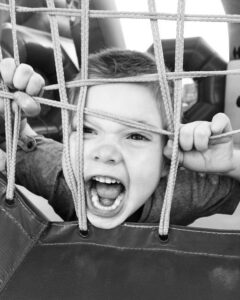The Importance of Self-Regulation

CBC Radio’s program Ideas aired a fascinating documentary on June 16, 2014 about the importance of helping children develop their capacity to self-regulate. The broad category of ‘self-regulation’ refers to a group of abilities that includes being aware of and able to change emotional states, moving the focus of attention from any one thing to any other thing, and controlling impulses long enough to get beyond momentary frustrations. Children who can’t regulate their behaviour effectively in a classroom, who can’t ‘switch gears’ and change their focus from recess back to math when the bell rings, and who can’t calm themselves when they feel stressed will struggle to fit in. Rejection from peers and disapproval from adults can be painful and lead to children internalizing the labels of being ‘broken’ and unwelcome, leading to needless suffering over the long-term.
The documentary featured psychologist and child development expert Dr. Stuart Shanker, who spoke about how rates of anxiety are on the rise in North American children. He speculated that might be related to pre-birth factors influencing brain development in utero, like maternal stress and exposure to neurotoxins, and also to the overuse of TV and video games, which “capture attention but do nothing to waken the senses.” Physical, emotional or sexual abuse in childhood can also leave a child’s defense systems on high alert.
Regardless of how it may come about, an overactive nervous system arouses the body’s fight-flight systems to the point where, in extreme cases, the ability to self-regulate and shut off arousal can become overworked. In Dr. Shanker’s terms, it’s like having a car’s gas pedal pushed to the floor for so long that the car loses the ability to brake.
A brain that is stressed (or over-aroused) will protect itself by conserving energy, shutting down other areas of functionaility that aren’t required for life-support, like the frontal lobes. We use the frontal lobes for problem-solving, planning how to make our way through challenges, and for regulating our emotions. See the problem? Children who are overstressed or unable to self-regulate effectively may find themselves unable to use the very parts of the brain that are needed to get along with others, solve complex academic problems like school assignments and social puzzles, like figuring out how to take a bathroom break when the teacher holds the hall pass. From this perspective, self-regulation is at the heart of a child’s ability to learn and function socially. Whereas hyper-aroused states turn on our alarm systems, calm states turn them off, reengaging our attention and learning systems, and enabling us to get something out of education and our time at school. This is at the heart of Shanker’s approach to helping kids self-regulate.
 Shanker proposes that there’s no such thing as ‘a bad kid,’ and points out how people often judge and label children who struggleto fit in. It’s important, he says, for all the adults in a child’s life (that is, family, teachers and others) to be able to recognize and appreciate what that child is doing to self-regulate. For example, some kids need to move around to think; others may fidget as a way to self-soothe. While they may not look like they’re listening, they usually are. Other kids need time alone to collect themselves when they feel overwhelmed. It’s important to see those behaviours for what they are, namely strategies for coping with anxiety and stress, because hostility and inflexibility from adults only makes it worse. A solid psychological assessment psychological assessment can help parents and teachers understand a given child’s strengths and areas that need to be strengthened further.
Shanker proposes that there’s no such thing as ‘a bad kid,’ and points out how people often judge and label children who struggleto fit in. It’s important, he says, for all the adults in a child’s life (that is, family, teachers and others) to be able to recognize and appreciate what that child is doing to self-regulate. For example, some kids need to move around to think; others may fidget as a way to self-soothe. While they may not look like they’re listening, they usually are. Other kids need time alone to collect themselves when they feel overwhelmed. It’s important to see those behaviours for what they are, namely strategies for coping with anxiety and stress, because hostility and inflexibility from adults only makes it worse. A solid psychological assessment psychological assessment can help parents and teachers understand a given child’s strengths and areas that need to be strengthened further.
Check out Shanker’s book on helping children learn to self-regulate: Self-reg: How to help your child (and you) break the stress cycle and successfully engage with life.
The post The Importance of Self-Regulation appeared first on Shift Cognitive Therapy.
